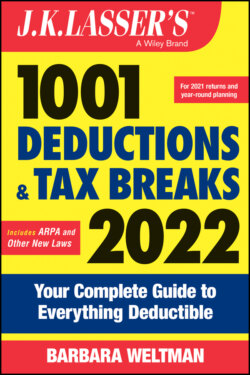Читать книгу J.K. Lasser's 1001 Deductions and Tax Breaks 2022 - Barbara Weltman - Страница 8
Introduction
ОглавлениеThe COVID‐19 pandemic triggered a number of changes in tax rules designed to help individuals cope financially with the economic fallout in the economy. Some changes are temporary, while others are permanent. The word “taxes” makes most people groan. There are good reasons for this response: First of all, the cost of paying your taxes annually can be a financial burden. You may feel taken to the cleaners every time you view your paycheck after withholding for federal income taxes (not to mention state income taxes as well as Social Security and Medicare taxes). And taxes are time consuming—to gather information, meet with a tax professional if you use one, or prepare and submit your own returns.
Second, it can cost you money to get your taxes done. The IRS says that nearly 60% of taxpayers use paid preparers for their returns. Of course, because more than 90% of individual income tax returns are completed by computer (through a paid preparer, with software, or FreeFile), the places where deductions and credits are entered on the return is not critical to you; it's effectively done automatically.
Third, the tax law is very complicated and changing all the time. There have been several major tax acts impacting 2021 returns. These include the Consolidated Appropriations Act, 2021, and the American Rescue Plan Act.
Fourth, you have to know what the tax rules are and can't claim ignorance to avoid taxes and penalties. Even if you use a tax professional or tax preparation software to prepare your return, you remain responsible for your taxes. The Tax Court has noted that using software is not an automatic excuse to avoid underpayment penalties.
How can you combat the feeling of dread when it comes to taxes? It helps to know that the tax law is peppered with many, many tax breaks to which you may be entitled. These breaks allow you to not report certain economic benefits you enjoy or to subtract certain expenses from your income or even directly from your tax bill. As the famous jurist Judge Learned Hand once stated (in the 1934 case of Helvering v. Gregory in the Court of Appeals for the Second Circuit):
Anyone may arrange his affairs so that his taxes shall be as low as possible; he is not bound to choose that pattern which best pays the Treasury. There is not even a patriotic duty to increase one's taxes. Over and over again the Courts have said that there is nothing sinister in so arranging affairs as to keep taxes as low as possible. Everyone does it, rich and poor alike, and all do right, for nobody owes any public duty to pay more than the law demands.
So get your tax affairs in order and legally reduce what you pay each year to Uncle Sam!
In getting a handle on how to do this by taking advantage of every tax break you may be entitled to without running afoul of the Internal Revenue Service (IRS), there are some simple rules to keep in mind. They include:
You must report all of your income unless a specific law allows you to exclude or exempt it (so that it is never taxed) or defer it (so that it is taxed at a later time).
You can claim deductions only when and to the extent the law allows. Deductions are referred to as a “matter of legislative grace”; Congress doesn't have to create them and does so only for some purpose (for example, to encourage economic activity or to balance some perceived inequity in the tax law).
Tax credits are worth more than tax deductions. A credit reduces your tax payment on a dollar‐for‐dollar basis; a $1,000 credit saves you $1,000 in taxes. A deduction is worth only as much as the top tax bracket you are in. Suppose you are in the 24% tax bracket, which means this is the highest rate you pay on at least some of your income. If you have a $1,000 deduction, it is worth $240 (24% of $1,000) because it saves you $240 in taxes you would otherwise have to pay.
In a number of cases, different deduction rules apply to the alternative minimum tax (AMT), a shadow tax system that ensures you pay at least some tax if your regular income tax is lower than it would have been without certain deductions.
Whether you prepare your return by hand, use computer software or an online solution, or rely on a professional, this book is designed to tell you how to get every tax edge you're entitled to. Knowing what to look out for will help you plan ahead and organize your activities in such a way that you'll share less of your hard‐earned money with the government.
